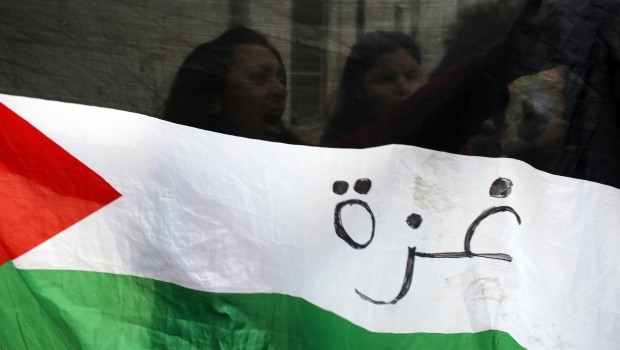
Demonstrators hold a Palestinian flag during a protest outside Jerusalem’s magistrates’ court in support of Samer al-Issawi, one of four Palestinians held by Israel who have been on an intermittent hunger strike, February 19, 2013. REUTERS/Ammar Awad
London, Asharq Al-Awsat—The Hamas government in Gaza has issued orders to its officials not to meet with or grant interviews to the Israeli media.
According to a report published by the UK-based The Guardian newspaper, the governmental decree—issued earlier this week—reads: “The [Hamas] government has decided to bar co-operation or work with Zionist media due to its hostility. The prohibition applies to all Palestinian reporters and journalists.”
The Hamas decision also includes instructions to all government officials not to grant interviews or comments to Israeli press or television.
The Israeli media has largely been dependent on local Palestinian or international journalists for Gaza news since Tel Aviv banned Israeli journalists from entering the Gaza Strip in 2006.
Matan Drori, foreign news editor for Israel’s Maariv newspaper, described Hamas’s decision as being “very unfortunate.” Speaking to The Guardian, he said: “It is important for Israelis to understand the motivations and behavior of the other side, and perhaps also as a way of building bridges for the future. It will be a major loss not to have an authentic voice from inside Gaza.”
Whilst Sami Ajrami, Maariv newspaper’s Gaza correspondent over the past 18 months, said that “the Israeli public should know what’s happening in Gaza. This is not good for the Palestinian cause. But we are under the Hamas regime, and Hamas has been criticized a lot in the Israeli and international media, so they want to impose controls.”
For its part, the Paris-based Reporters Without Borders organization expressed its shock at the Hamas decision, calling for this to be lifted. Reports Without Borders said “this is the first time the Palestinian authorities have issued such a ban, which poses a serious threat to freedom of information. It will also create problems for the not insignificant number of Palestinian journalists in the Gaza Strip who work for Israeli TV stations and newspapers.”
The press watchdog urged “the Hamas government to reconsider this order.”
Abeer Ayyoub, a 25-year old journalist who has written for both The Guardian and Israel’s Haaretz newspaper also called on the Hamas government to reconsider its ban. She said “there are two sides to the conflict, and both sides should be covered” adding “the Israeli media will have no one in Gaza writing about what is going on.”
Hamas has reportedly cracked down on Palestinian journalists inside the Gaza Strip who have been critical of the government. A Human Rights Watch report published last year asserted that “journalists in the Gaza Strip have…faced arbitrary detention, assault and other forms of harassment from the Hamas authorities.”
